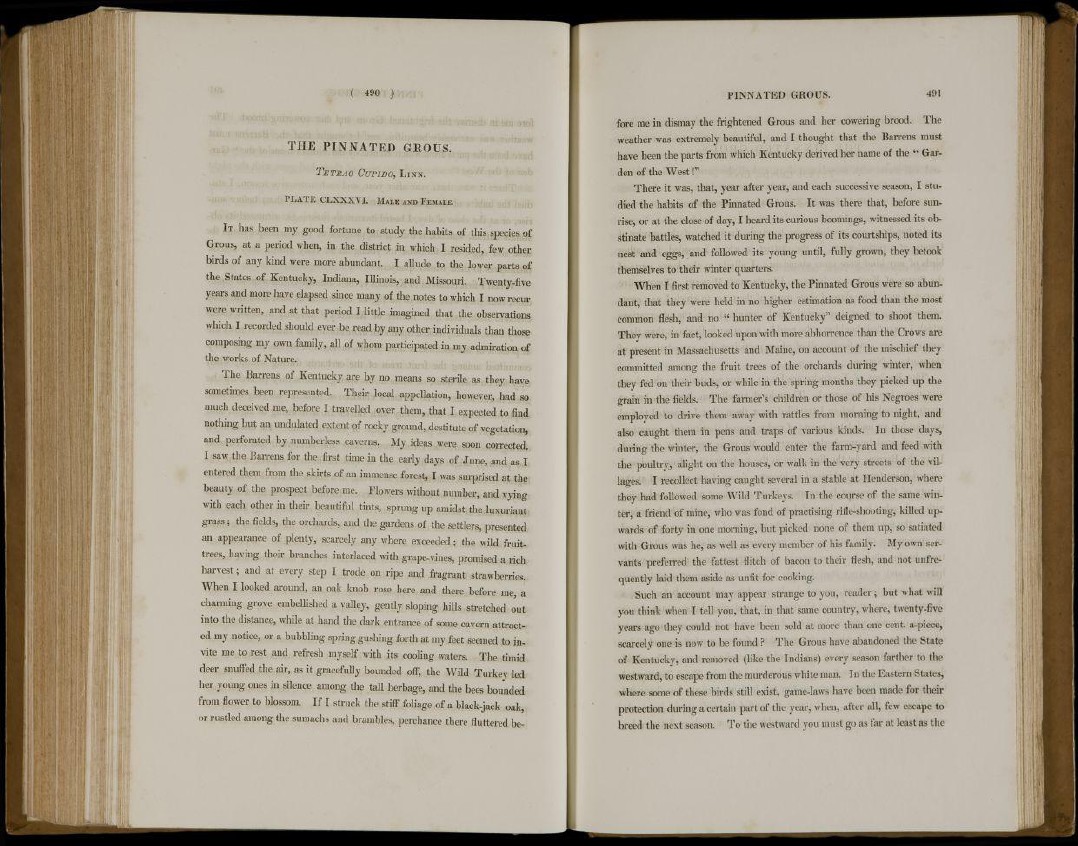
( 490 )
T H E P I N N A T E D G R O U S .
TETRAO CUPIDO, LINN.
P L A T E C L X X X V I . MALE AND FEMALE.
IT has been my good fortune to study the habits of this species of
Grous, at a period when, in the district in which I resided, few other
birds of any kind were more abundant. I allude to the lower parts of
the States of Kentucky, Indiana, Illinois, and Missouri. Twenty-five
years and more have elapsed since many of the notes to which I now recur
were written, and at that period I little imagined that the observations
which I recorded should ever be read by any other individuals than those
composing my own family, all of whom participated in my admiration of
the works of Nature.
The Barrens of Kentucky are by no means so sterile as they have
sometimes been represented. Their local appellation, however, had so
much deceived me, before I travelled over them, that I expected to find
nothing but an undulated extent of rocky ground, destitute of vegetation,
and perforated by numberless caverns. My ideas were soon corrected.
I saw the Barrens for the first time in the early days of June, and as I
entered them from the skirts of an immense forest, I was surprised at the
beauty of the prospect before me. Flowers without number, and vying
with each other in their beautiful tints, sprung up amidst the luxuriant
grass; the fields, the orchards, and the gardens of the settlers, presented
an appearance of plenty, scarcely any where exceeded ; the wild fruittrees,
having their branches interlaced with grape-vines, promised a rich
harvest; and at every step I trode on ripe and fragrant strawberries.
When I looked around, an oak knob rose here and there before me, a
charming grove embellished a valley, gently sloping hills stretched out
into the distance, while at hand the dark entrance of some cavern attracted
my notice, or a bubbling spring gushing forth at my feet seemed to invite
me to rest and refresh myself with its cooling waters. The timid
deer snuffed the air, as it gracefully bounded off, the Wild Turkey led
her young ones in silence among the tall herbage, and the bees bounded
from flower to blossom. If I struck the stiff" foliage of a black-jack oak,
or rustled among the sumachs and brambles, perchance there fluttered be-
PINNATED GROUS. 491
fore me in dismay the frightened Grous and her cowering brood. The
weather was extremely beautiful, and I thought that the Barrens must
have been the parts from which Kentucky derived her name of the " Garden
of the West !"
There it was, that, year after year, and each successive season, I studied
the habits of the Pinnated Grous. It was there that, before sunrise,
or at the close of day, I heard its curious boomings, witnessed its obstinate
battles, watched it during the progress of its courtships, noted its
nest and eggs, and followed its young until, fully grown, they betook
themselves to their winter quarters.
When I first removed to Kentucky, the Pinnated Grous were so abundant,
that they were held in no higher estimation as food than the most
common flesh, and no " hunter of Kentucky" deigned to shoot them.
They were, in fact, looked upon with more abhorrence than the Crows are
at present in Massachusetts and Maine, on account of the mischief they
committed among the fruit trees of the orchards during winter, when
they fed on their buds, or while in the spring months they picked up the
grain in the fields. The farmer's children or those of his Negroes were
employed to drive them away with rattles from morning to night, and
also caught them in pens and traps of various kinds. In those days,
during the winter, the Grous would enter the farm-yard and feed with
the poultry, alight on the houses, or walk in the very streets of the villages.
I recollect having caught several in a stable at Henderson, where
they had followed some Wild Turkeys. In the course of the same winter,
a friend of mine, who was fond of practising rifle-shooting, killed upwards
of forty in one morning, but picked none of them up, so satiated
with Grous was he, as well as every member of his family. My own servants
preferred the fattest flitch of bacon to their flesh, and not unfrequently
laid them aside as unfit for cooking.
Such an account may appear strange to you, reader; but what will
you think when I tell you, that, in that same country, where, twenty-five
years ago they could not have been sold at more than one cent, a-piece,
scarcely one is now to be found ? The Grous have abandoned the State
of Kentucky, and removed (like the Indians) every season farther to the
westward, to escape from the murderous white man. In the Eastern States,
where some of these birds still exist, game-laws have been made for their
protection during a certain part of the year, when, after all, few escape to
breed the next season. To the westward you must go as far at least as the